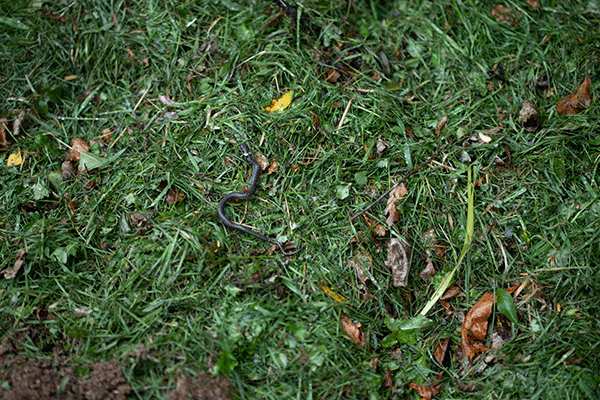For some time, we’ve been thinking about how best to improve things for wildlife at Riverford, without losing focus on growing veg to the best of our ability.
Organic farming (which doesn’t use any artificial pesticides or herbicides) has an obvious head start in supporting biodiversity, but there’s always more to be done.
The trick is working out what will have the greatest impact without inadvertently doing harm; there’s no point planting a forest on top of a rare orchid. With that in mind, we’ve had some experts in to assess the biodiversity across our land and recommend the best (practical) course of action. Once we know our baseline level of biodiversity, we’ll be able to see what effects our efforts have in future years.
Covid delayed things by over a year, but at last the survey results are trickling in. While hopes of finding beavers or big cats have been dashed, there’s plenty of cause for optimism: our reservoirs are pretty diverse, with breeding coots and little grebes (both birds which are scarce in Devon).
There are also DNA traces of the critically endangered European eel. Further downstream, the wildflowers monkshood and dusky cranesbill are growing, and a wetland meadow is thick with invertebrates and flora. Setting out mats to attract reptiles, a team of volunteer co-owners found grass snakes and slow worms.

And we were also visited by cirl buntings. These extremely vulnerable birds – down to 118 breeding pairs in 1989, and found only in the South West – have been brought back from the brink by habitat improvements made by farmers with advice from the RSPB.
So now we need to use this info to guide our next steps. In the short term, we are going to plant some bird-friendly seed mixes near hedgerows that cirl buntings might like. This will also help beneficial insects, as well as providing habitat for small rodents, which in turn provide food for raptors such as barn owls. We will create a more focused tree-planting programme. And we will undertake further surveys; we want to know more about birds, veteran trees and even dormice.
This isn’t the start of our work on biodiversity; it’s more an expansion of what we already do. But it feels good to be thinking even more about what will feed us and our environment in 60 years’ time, as well as in 60 days.















Great stuff Riverford team. For readers interested in this subject I strongly recommend English Pastoral by James Rebanks. Written by a farmer it describes his journey from “old fashioned” mixed farming, through intensive farming and back to modern mixed farming and the importance of biodiversity. Whilst he is not promoting organic farming per se, this book confirmed my decision to buy organic wherever possible to support good farming methods like Riverford’s.
Hi Tim W,
Love James Rebanks books, though yet to read English Pastoral. I love how he portrays the culture of farming with such colour, something that is often overlooked but essential to understand if we want to understand how to shift to more sustainable practices. WL looked at why emotions matter in this transition:
https://wickedleeks.riverford.co.uk/news/farming-mental-health-environment-ethics/emotions-matter-farming-say-experts
Also would be interested to know what he means by modern mixed farming, and how that differs to “old fashioned” mixed farming, as nature-friendly farming can so often be perceived as luddite and a desire to return to the ‘old ways’.
Best, Jack
Good to see Riverford well ahead of most and doing the best for biodiversity. Well done.
Hello and thank you for sharing this newsletter in one of my veg boxes received yesterday. I read it and thought how “biodiversity” looked with the eyes of knowledge – of the known – just wasn’t “biodiversity” anymore :)! Naming what is living and giving it a utilitarian “function” is exactly what made us kill biodiversity, in the name of utility. We cannot recover biodiversity with the same mindset, it seems to me. Although the “eyes” of knowledge look at nature with utilitarian eyes, I doubt that’s what nature is about. In my experience biodiversity is the surprising, often astonishing “new” , not necessarily “defined” – what I had never noticed or seen before – which I was then seeing because I had changed, or maybe also what I was watching had possibly changed, “something” had made it possible for us to connect, for me to “see”, differently.
Good to be reminded that there is a reason deep spirituality is connected with the land worldwide – many belief systems focus on us being part of the web of life, not separate to it, and have a non mechanistic view of nature.
I was interested in reading this latest news from the farm. It is so encouraging to hear how you are making a difference to the natural environment and wish to expand on it, by responding to a biodiversity survey on your land. I wonder if you have discovered any hedgehogs whilst undertaking this assessment? If you have, I am sure the British Hedgehog Preservation Society would be interested in your findings for their hedgehog map. Keep up the great work!
As Tim W highlights above, James Rebanks’ English Pastoral describes the transition back to a more traditional and regenerative style of farming beautifully. It is very much about looking at the whole ecosystem rather than working to attract particular species; it is a change in mindset, rather than a change in individual processes. I think it is Gabe Brown who said “If you want to make small changes, change the way you do things; if you want to make major change, change the way you SEE things.”